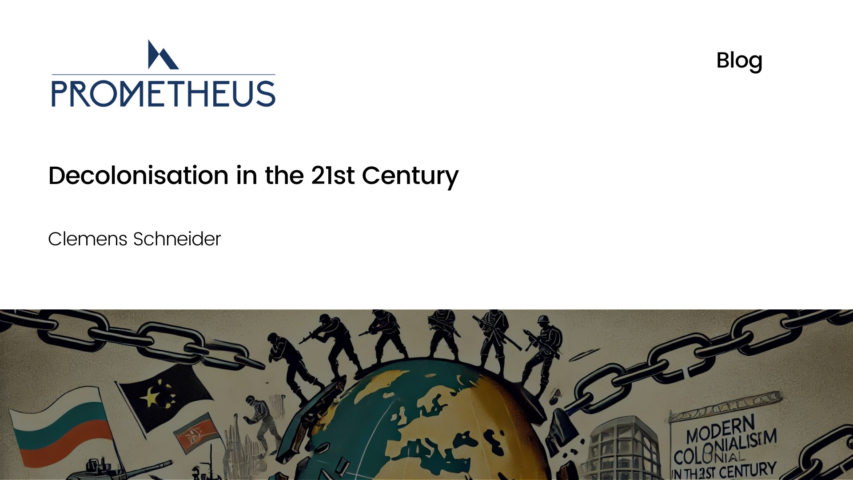Decolonisation in the 21st Century

Decolonisation in the 21st Century
Clemens Schneider // 26 September 2024
Fighting against the consequences of colonialism that continue to make an impact on the world is justified. However, colonialism that originates from regions other than the West ought to be dealt with just as strongly.
Pith Helmet Nonchalance
What the major and minor powers of Europe and the US have done to people in other parts of the world – and sometimes even on their own doorstep – sends shivers down the spine. Of the European states that existed at the time of colonisation, only Poland, Denmark, Sweden, and Switzerland were largely uninvolved in the grand project of subjugating the world. All other states, their rulers – and often enough, the people – did not shy away from appropriating the lives and properties of other people. The degree of brutality and barbarism varied. But the nonchalance with which European states robbed millions of people of their human rights and property was the same – from Belgium to the Ottoman Empire, from Hungary to Portugal.
This lack of concern for the fate of other people slowly changed – not least due to the increased spread of the media. Many atrocities committed during the active colonisation of the “New World” were only known to the victims, perpetrators, those who ordered them, and a few observers. However, by the late nineteenth century, reports and images of the slaughter in Congo and Namibia were already reaching many regular households. The topic also slowly penetrated cultural spheres. At some point, it was no longer just the victims who were painfully aware of colonialism. Empathy began developing among people who were on the other side. The collapse of large colonial empires can certainly to attributed to many different factors. But it was also crucial that an increasing proportion of the European population was no longer prepared to support the system for moral reasons.
New Silk Road instead of protectorates
As is often the case in human history, when an evil is no longer tolerated, it adapts and returns in a different form. When princely censorship was abolished, bourgeois etiquette stepped in, which was then recently replaced by scribbling students. Today, protectionism no longer utilises xenophobia, but rides the wave of social responsibility, i.e., supply chain laws instead of tariffs. It’s the same with colonialism. Today, it is creeping around on velvet paws. An example would be certain gestures of development aid made by Western countries to the Global South.
However, some autocracies and dictatorships that exist today are a more direct reinvention of colonialism. For example, a significant proportion of Russia’s infantry currently waging war against Ukraine were recruited from ethnic minorities. This reinvention also includes systematic subjugation, such as the targeted eradication of non-Russian cultures in Chechnya, the deployment of militia in Syria, Libya, Mali, and other African states, and the establishment of puppet regimes in Belarus, Transnistria, or more recently, in Kyrgyzstan.
The People's Republic of China is another example of Colonialism 2.0. After the communist regime had satisfied its hunger for land with the subjugation of East Turkestan (Xinjiang) and Tibet in the 1950s, and the blessings of Maoism and Han civilisation had been brought to the last mountain and forest peoples in the tried and tested colonialist manner, it began to adapt colonialism to fit new requirements. Combat troops were replaced with construction troops, treaties and favourable loans. Instead of sending your own governors and viceroys, you outsource this to local forces, which you make compliant with money and political backing. Yes, it is no longer Chinese troops that put down uprisings. But without Chinese weapons, military advisors, and backing on the international stage, some regimes would no longer be in the saddle.
Not only reappraise history, but also stop it!
Interest politics has its justification on the international stage. And not every asymmetric relationship between states has to be colonial – as we European free riders of the US security architecture know all too well. But the regimes of Russia and China are not just trying to assert national interests. They are perfecting a modern colonialism that is geared towards creating lasting dependencies and consolidating their cultural and systemic hegemony. The latter in particular plays a major role. The dominant system of liberal democracies is to be overcome. This new colonial policy wants to fuel situations everywhere – such as in Belarus, Syria, Mali or Pakistan – because autocrats are so much better partners.
While students in Western countries are working intensively – and often with the right thrust – to critically examine the past and present of historical colonial masters, today’s colonial powers fly completely under the radar. As important as it is to do justice to the victims of yesterday, don't the victims of today and tomorrow deserve much more of our attention, because we can at least still change their situation? Where are the angry protests in front of the Chinese embassy when another report on the situation of forced labourers in the west of the country is published? Where are the protests against the sale of books by nationalist and racist Russian authors? The guilt of the West in this matter should be an incentive to shout "Never again!" We would do well not only to come to terms with the history of colonial barbarism, but also to help ensure that it is not continued. This would give people who are dedicated to decolonisation yet another enormously important field of activity!
This blog was originally published by Prometheus in German.
EPICENTER publications and contributions from our member think tanks are designed to promote the discussion of economic issues and the role of markets in solving economic and social problems. As with all EPICENTER publications, the views expressed here are those of the author and not EPICENTER or its member think tanks (which have no corporate view).



